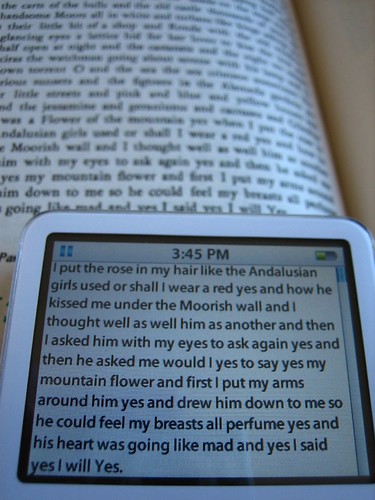That basic unit of literature, the sentence, has been getting a lot of attention lately thanks to Stanley Fish’s new book How to Write a Sentence. In it, Fish makes an argument that sentences are to writing what paint is to painting:
But wouldn’t the equivalent of paint be words rather than sentences? Actually, no, because while you can brush or even drip paint on a canvas and make something interesting happen, just piling up words, one after the other, won’t do much of anything until something else has been added. […]
Before the words slide into their slots, they are just discrete items, pointing everywhere and nowhere. Once the words are nestled in the places “ordained” for them — “ordained” is a wonderful word that points to the inexorable logic of syntactic structures — they are tied by ligatures of relationships to one another. They are subjects or objects or actions or descriptives or indications of manner, and as such they combine into a statement about the world, that is, into a meaning that one can contemplate, admire, reject, or refine.
But what if the sentence were more than just the basic building brick of prose—what if it were the whole building? In the New York Times, author Ed Park examines the “Very Long Sentence”, from the well-known Molly Bloom soliloquy in Ulysses to lesser-known examples like a book-length sentence by Czech writer Bohumil Hrabal. Park writes:
In this age of 140-character Twitter posts — not to mention a persistent undercurrent of minimalism in our literature — there’s something profoundly rejuvenating about the very long sentence. For the sake of the novel, and ourselves, let’s hope that Hrabal wasn’t being prophetic when he wrote, four decades ago, “People twitter away like magpies and don’t really care.”
The long sentence certainly has a magic of its own, and it’s incredibly hard to write a good one. But I wonder why we inherently value the long and dismiss the short as frivolous. Writing a really good short sentence is harder than it seems. And it’s not that the interest in the short sentence is new, either—”twittering” has a longer history than you’d think. The website Tweets of Old collects tweet-like snippets from old newspapers that are both intriguing and hilarious (and yes, it has a Twitter feed):
Mrs. J.C. Anderson, a giddy young thing, and the mother of 16 children, has run away with a big-trousered dude 25 years of age. OH1889 (Xenia, Ohio 1889 -The Telegraph)
A fatal epidemic has broken out among the goldfish in Jackson. MI1872 (Jackson, Michigan – Detroit Daily Press Telegraph, 1872)
A bird cage crashed to the floor recently in a house at Petaluma and shocked Mrs. Cora Woodman mute. She may not recover.CA1887
Even Park’s apprehension about where the world is heading isn’t a new one:
We are living in curiously contorted times. TX1899



